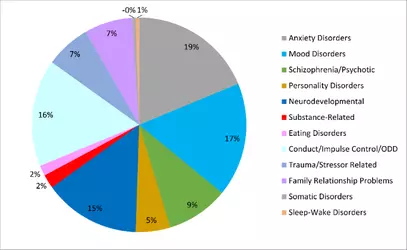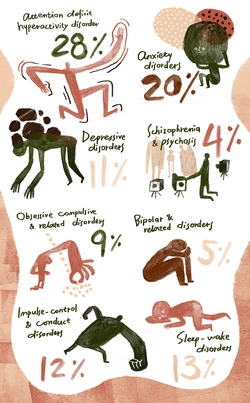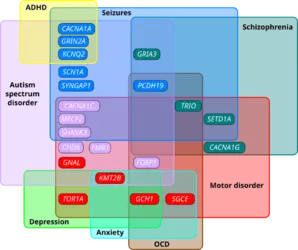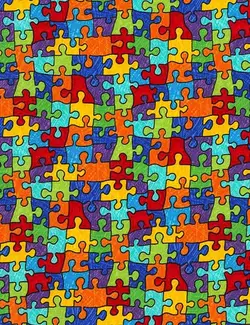- Joined
- Apr 11, 2022


(I have never once in my life got ASCII art to copy paste correctly so fuck it, it's a screenshot)
AUTISM
What is it? (other than the disease that birthed this entire site
It's strangely misunderstood and alien even to this day despite being an accepted mental illness that so many have.
I myself was diagnosed with Aspergers
Obviously to be on the "spectrum", as it's known, is to have an incurable brain disorder that causes you to function in a bizarre manner that is shunned by regular people. Most people would say that it puts you in a worse state than you would be had your brain operated in the normal manner, but there are some that say that it gives you hidden insights that nobody else can see.
With autism comes a number of other ailments. If you are autistic then you have a high chance of having anxiety, depression, dyslexia, OCD, various phobias, to name a few.
If there is a plus side then it's that you likely obtain one or more obsessions, and you are probably quite creative (or at least have a drive to create).
Here are a couple of random graphs to illustrate that.

Here is a much more autistic graphic -

Or if you are more into squares -

Being that people with autism don't know what it's like to be normal, it's very hard to describe the experience of having an autists brain
"Autistic people may: find it hard to communicate and interact with other people. find it hard to understand how other people think or feel. find things like bright lights or loud noises overwhelming, stressful or uncomfortable."
Which autists would say is correct but it doesn't come anywhere close to accurately detailing the reality of our lives.
Here is a great write up on some of the issues faced with autism that I saw posted in a Youtube comment, it might be a copy pasta but either way it's one of the best explanations of the autist experience that I have seen -

"Autistic people often run into communication difficulties when interacting with non-autistic people. This may not be due to autistic people being worse at communicating. Rather, it might be from autistic people communicating differently. The double-empathy problem of autism highlights this issue. The problem is this: Autistic difficulties in communication are reduced or vanish when interacting with other autistic people. Given the common description of autism causing general communication deficits, this makes no sense. In the following paragraphs, I will highlight some of the day-to-day problems that arise from this inherent difference in communication.
1. Intentional Display in non-autistic people For non-autistic people, intentionally displaying behaviors and emotions they do not actually feel is part of daily life.This is learned in childhood. Crying intentionally can yield beneficial treatment from adults. Pretending to be sleepy can result in comforting treatment from parents. Pretending to be interested in a one thing to deceive another child, to reach your goals, is a common behavior. Even little children already engage in complex deception and manipulation.
In my opinion, this does not disappear in adulthood. Rather, these behaviors are just altered into their respective "adult" versions. Examples include:
- exaggerating emotions or pains to get attention quicker from doctors or nurses
- deliberately staging fights or escalating a situation to get your way in business or customer service
- using fake gestures of friendliness to "test" other peoples trustworthiness
- venting emotions loudly in order to signal to a partner that you want to be comforted emotionally
There are many more examples, but for the sake of brevity we will leave it at this.
2. Intentional Display and autistic people Autistic people do not do this. In my personal experience as an autistic person, and from the gathered words of other autists, I derive that we can not "act" the part. Since "acting" and insincerity is seen as necessary by non-autistics, they misjudge autistic people as being "extremely honest by default." This is not the case. If you mentally don't operate in a way where you are prone to playing pretend, then you arenot being intentionally honest, it is just who you are.
This projection of non-autistic traits onto autists does not stop here. Namely, non-autistics project intentions into everything autists do. If the autist is honest and it hurts the feelings of the non-autist, the autist is often accused of having deliberately insulted the non-autist.
Another example that I gave earlier is that of exaggerating pain to get quicker attention from doctors and nurses. The autistic person may not do this, even with servere injuries. One example from an autism textbook in my posession is that of a man who waited paitently in the ER room until he passed out from an asthma attack.
He simply did not think to communicate through intentional display that he was in severe peril and needed help immediatly. As such, the nurses and doctors paid him no heed until the situation escalated.
An autist may even be accused of faking illness or such as a result. In childhood, this can often result in unintentional gaslighting by the parents. it is normal for non-autistic children to push boundaries until their parents discipline them, and parents usually correctly interpret the childs behavior in this case.
However, if the parents are not autistic, but the child is, many of the childs requests for peace, quiet, screams of trouble and pain may be interpreted as intentional display, aka, an attempt to subvert the parents authority. Thus, the child is punished without understanding why. Naturally, this can lead to trauma.
Another example that you often here from autistic people is problems with the difference in how empathy is communicated. A non-autistic person communicates their need for empathy through intentional display. So they may say to another person, oh, I am so down, or something similar. The other person will then give them a pat on the back, some encouraging words and send them on their way.
However, to autistic people this seems insulting or dismissive, since the autistic way of expressing empathy is often more concrete and problem oriented. So if someone says to an autistic person "oh, I am so down" the autistic person might ask questions like "why?" and try to find a solution.
Normal people do not want solutions though, they want emotional support. So just like the autist perceives the non-autist as rude and dismissive, the non-autist perceives the autists way of expressing helpfulness as insulting.
3. The big larp and what autists need to understand Now that we have laid the groundwork, we can get to the main point. As autists we tend to interpret non-autistic peoples constant bickering, fighting and complaining about issues as real. We assume there must be a real reason behind it, something that demands urgent attention and solving.
This is often not the case though. Most of the time people do in-fact not have significant issues. They just engage in drama because it gives them a feeling of meaning and they feel important in the eyes of others.
For example, experiencing periodic bouts of depression is a normal part of human experience. Most people recover on their own from almost all issues they face. Depression goes away on it's own after a few weeks, when acceptance sets in. Therapy is also built around this well known fact. Most people just need a slight reset, someone who listens to them like a therapist and woosh, they are back on track.
For some people mental illness even becomes a sort of identity. They do not want to get better, because fundamentally they don't view themselves as sick to begin with. This is called morbid gain in the literature.
Autistic people often do have real problems though. The list of co-morbid health conditions is long, ranging from things like epilepsy, motor-control issues, to higher incidence rates for heart- and cardiovascular disease.
However, as already explained, when autistic people complain in their flat-affect, monotone voice to other people in order to get the help they more than likely REALLY need, they may not be listened to or even mocked. Other people will just assume the autist is like them and just larping to get attention or have his identity construct validated.
This can feel like being constantly gaslit and insulted to the autistc person. That may also be why many autistic people become "assholes" or "anal" about things. They feel that if they don't make themselves very clear to other people, they will be ignored or worse.
My advice to every autistic person reading this: Exaggerate your issues. You are probably massively underselling the scope of your suffering already anyway, without even noticing. Do not fall into the trap of being "realistic" when talking to health care providers. State in violent and extreme terms why you need help.
If you have ever wondered why there are people around you that seem way more functional than you but receive more help from the authorities - this is why. You have to practically scream in agony, or they will park your ass and dismiss you."
__
And so that hopefully sets the scene for the world of autism. A lot of users of this site and a lot of the subjects that are gossiped about here are on the spectrum. Perhaps together we can understand more about ourselves and the strange draconian beast that plays such a large part in our lives.
Please give your experiences, your knowledge or questions into the monument of autism that is this thread, and maybe it will all finally make sense.
